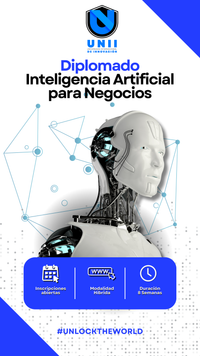Diploma in Artificial Intelligence for Entrepreneurs and Business Owners
Goals:
-
Understanding the Fundamentals of Artificial Intelligence: Familiarize participants with the basic concepts, applications, and benefits of artificial intelligence in the business environment
-
Implementing AI tools in business: Teach the practical use of technologies such as AI presentations, videos, process automation to optimize business operations and improve decision making.
-
Design business innovation strategies: Help participants identify opportunities to integrate artificial intelligence into the creation of products, services or business models that drive competitiveness.
-
Strengthening digital transformation: Training participants to lead digitalization projects in their companies by adopting AI tools, ensuring their adaptation to an increasingly technological market.
Syllabus:
-
Introduction to Artificial Intelligence
- Importance of AI in the business world.
- Fundamentals of Artificial Intelligence
- History and evolution of AI.
- AI Basics
- AI Applications in Business
-
AI case studies in different industries.
-
AI Tools for Marketing and Sales
- AI in Digital Marketing
- Marketing Automation
- Data analysis and customer segmentation.
- Personalization of user experiences.
-
AI in Business Management
- AI in Project Management
- Project optimization and monitoring.
- Collaboration and productivity tools.
- Practical tools
-
Ethics and AI
- You will learn the fundamental aspects related to ethics.
- Impact of AI and ML on society and the business world,
- Equity,
- Transparency
- Responsibility in the development and use of models.
-
AI in Customer Service
- Implementation and management
- Improving customer experience.
- Practical tools
- Sentiment Analysis and Feedback
- Analysis of customer comments and opinions.
- Product and service improvement based on feedback.
-
Development of Custom AI Solutions
- AI Solutions Design
- Identification of problems and opportunities in the business.
- Design and planning of AI solutions.
- Tools and platforms for AI development.
- Prototyping and testing.
- Practical tools
-
AI Implementation and Scalability
- Implementation strategies in business.
- Integration with existing systems.
- Scalability of AI solutions.
- Continuous maintenance and updating.
- Practical tools
-
Final Project and Closing Ceremony
- Presentation of final projects by participants.
- Feedback and evaluation of projects.
- Networking and Collaboration
- Networking activities.
- Opportunities for collaboration and joint development.
Goals:
-
Understanding the Fundamentals of Artificial Intelligence: Familiarize participants with the basic concepts, applications, and benefits of artificial intelligence in the business environment
-
Implementing AI tools in business: Teach the practical use of technologies such as AI presentations, videos, process automation to optimize business operations and improve decision making.
-
Design business innovation strategies: Help participants identify opportunities to integrate artificial intelligence into the creation of products, services or business models that drive competitiveness.
-
Strengthening digital transformation: Training participants to lead digitalization projects in their companies by adopting AI tools, ensuring their adaptation to an increasingly technological market.
Syllabus:
-
Introduction to Artificial Intelligence
- Importance of AI in the business world.
- Fundamentals of Artificial Intelligence
- History and evolution of AI.
- AI Basics
- AI Applications in Business
-
AI case studies in different industries.
-
AI Tools for Marketing and Sales
- AI in Digital Marketing
- Marketing Automation
- Data analysis and customer segmentation.
- Personalization of user experiences.
-
AI in Business Management
- AI in Project Management
- Project optimization and monitoring.
- Collaboration and productivity tools.
- Practical tools
-
Ethics and AI
- You will learn the fundamental aspects related to ethics.
- Impact of AI and ML on society and the business world,
- Equity,
- Transparency
- Responsibility in the development and use of models.
-
AI in Customer Service
- Implementation and management
- Improving customer experience.
- Practical tools
- Sentiment Analysis and Feedback
- Analysis of customer comments and opinions.
- Product and service improvement based on feedback.
-
Development of Custom AI Solutions
- AI Solutions Design
- Identification of problems and opportunities in the business.
- Design and planning of AI solutions.
- Tools and platforms for AI development.
- Prototyping and testing.
- Practical tools
-
AI Implementation and Scalability
- Implementation strategies in business.
- Integration with existing systems.
- Scalability of AI solutions.
- Continuous maintenance and updating.
- Practical tools
-
Final Project and Closing Ceremony
- Presentation of final projects by participants.
- Feedback and evaluation of projects.
- Networking and Collaboration
- Networking activities.
- Opportunities for collaboration and joint development.
| Specification name | Specification Value |
|---|---|
| Genre | Negocio |
| Target audience | Adultos |



